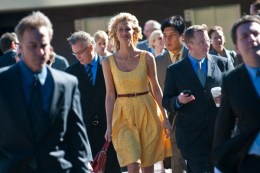
There are plenty of reasons to critique some of the half-hour series on HBO and Showtime (Weeds, Hung, The Big C) but the critique I’ve never gotten, nor had much patience for, is: “It’s supposed to be comedy, but it’s not funny enough!”
I know that classifying things helps make sense of the world, and as a writer I am familiar with the problem that you have to call things something. But it’s at best arbitrary to decide that things that are a half-hour on TV are supposed to make you laugh, and things that are an hour are supposed to make you cry, and that a show that doesn’t pick a side and fully commit to it is a failure. The movies have this problem to an extent, but at least in that genre there’s some willingness to accept, say, a movie like Sideways, which is funny, and also is not funny, and ultimately is a story about some people, and either you like it or you don’t.
All this went through my head last night re-watching HBO’s Enlightened, a problematic, hard-to-classify but strangely compelling character study, whatever you call it.
The series is a collaboration between star Laura Dern and writer / Amazing Race participant Mike White (who also appears as an actor in subsequent episodes of the show). Dern plays Amy Jellicoe, a corporate executive who loses her job after she has an affair with a married coworker and suffers a nervous breakdown. We catch up with Amy after she’s spent time at a spiritual retreat in Hawaii, where an encounter with a sea turtle led her to an epiphany—or what she thinks is one—about the world and her role in healing it. Returning to her old company (and sunnily, passive-aggressively dangling the threat of a lawsuit), she offers to create a new job for herself running a kind of green, corporate-penance public-service project. Her old bosses—preferring to simply neutralize a problem employee and not get sued—instead shunt her off to a job in an obscure division, run from a sub-basement.
That’s the premise, and the show is a half-hour long—which makes it a comedy, right?—so you might naturally assume that the show is a satire, spoofing Amy’s New Age philosophy. If it were only that, Enlightened would be a horrible show. Amy is indeed lacking in self-awareness and perhaps seriously deluded; she’s not egocentric so much as she seems to have projected her own personal healing project onto the entire world around her, which is not so interested. But she also sincerely believes in her awakening—and in its own, dark-comic way, Enlightened does as well.
Dern’s performance is one of those that we tend to call “brave,” especially when actresses do it, which is to say she’s willing to make herself look bad, emotionally and physically. (In the opening scene, she’s in mid-breakdown, wearing a MacArthur Park melting-cake of makeup on her distraught face.) Returning from her retreat, she floats on a cloud of dearly-paid-for bliss, which we soon see takes a lot of effort to maintain, especially when she runs into the skepticism of folks like her mother (Dern’s actual mother, Diane Ladd) or the backsliding of her druggie ex-husband (Luke Wilson). Her outlook is beatific, at great effort, but Dern and the script show the bitterness that it’s constructed to mask, as when she makes her job pitch to her former coworkers: “Wouldn’t you rather be working for a place that’s giving back to the world, instead of some corporate parasite that’s raping the land and people and like drugging America’s kids?”
It does make for uncomfortable viewing, which is a tough sell even on pay cable. I mentioned in my review of NBC’s Free Agents that its problem was being unwilling to commit to its essentially dark premise. Enlightened definitely commits. It doesn’t have its tone down; watching my review screeners, although I thought the pilot was technically well-made, it was four episodes in before I thought everything came together. It’s slow-going—translation: “boring,” if you’re less disposed to it than I am—and it will probably never be ha-ha funny or big-issue dramatic in a way that will draw a big audience.
But what may be its saving grace is its sympathy, and its willingness to take Amy seriously. The thing that distinguishes Enlightened from shows like Weeds and The Big C, is that it doesn’t feel the need to leaven the pathos at the heart of it with whimsical subplots, zany but functional supporting characters or—mostly—that irritating, this-is-a-quirky-dramedy music. Instead, it earnestly explores its idea: what happens when the ideal of individual self-actualization runs up against the prosaic realities of business and family.
You can see the absurdity and desperation in Amy when she describes—to her coke-snorting ex over drinks at a bar—what she felt inside when she went swimming with the sea turtles: “It was saying, this is all for you. And everything is a gift. Even the horrible stuff.” And yet it’s not laughable; it’s actually kind of beautiful, which makes it all the more awkward to see that she is clearly setting herself up for massive disappointment.
Enlightened is not really a comedy, not really a drama, and while it has loads of empathy, it lacks the warmth and sentimentality that we’ve come to associate with things that TV calls “dramedies.” Whatever it is, though, I want to see more of it.


